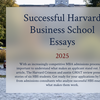Growing up in Third World countries such as Costa Rica and Dubai, Kim says he realized the importance of the United States military at an early age.
"Many Americans perceive political conflict and military threats as words, something on a TV set...and don't understand the reality of military conflict and what that entails," Kim said.
Though he admits it may seem "cliched," Kim says that he has come to value the freedom of the United States.
"It all sounds very high-brow, but there is reality behind it," Kim says.
And Scott H. Frewing '90 says the prospect of a four-year Navy scholarship was critical in his decision to enlist in the program.
"I couldn't attend Harvard without it," says Frewing.
Of the 85 students currently enlisted in the Army, Navy and Air Force ROTC programs, almost all receive some form of scholarship, officials from the three services say.
The Navy and Air Force offer four-year scholarships to midshipmen and cadets, funding student tuition and textbook expenses and providing a $100 monthly allowance.
Dwindling defense spending, however, has forced the Army to cut back on its ROTC awards, according to Maj. Ralph J. Gabriel, assistant professor of military science at the Massachusetts Institute of Technology (MIT). Two years ago, the Army began offering only 80 percent tuition funding to students at institutions such as Harvard that do not host the ROTC program on campus.
In exchange for tuition payments, all students must serve a total of eight years in their respective service upon graduation in active duty, the reserves or the National Guard.
While in college, cadets must take at least one course at MIT, usually centering on some field related to military science, and participate in weekly drills and laboratory exercises, according to ROTC documents.
Most students said that the requirements were not overly burdensome but still demanded effective time management.
Citing his hectic Tuesday schedule of classes, crew practice and ROTC sessions at MIT, Joel D. Hornstein '91, a platoon sergeant in Army ROTC, says he must juggle his activities in order to make the trek to MIT, where all ROTC exercises are held.
"ROTC definitely takes a great deal of time," Hornstein acknowledges.
But beyond the "nuisance" of the commute to MIT, most students deem ROTC challenging but not overly taxing, adding that their time committment is somewhat flexible.
Read more in News
Spring Facelift in the Works For Indoor Athletic Building












